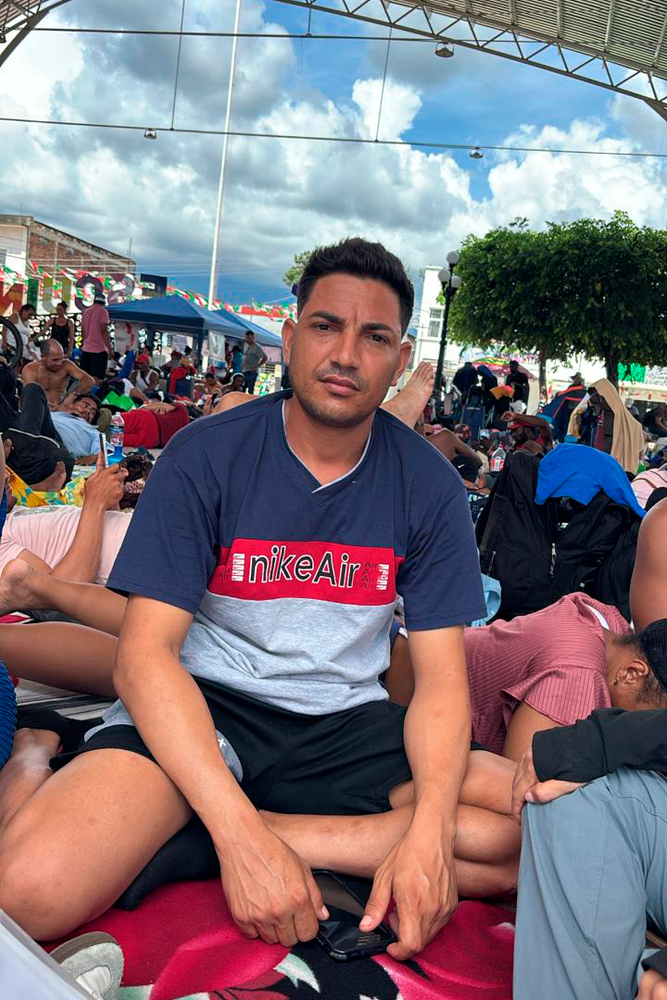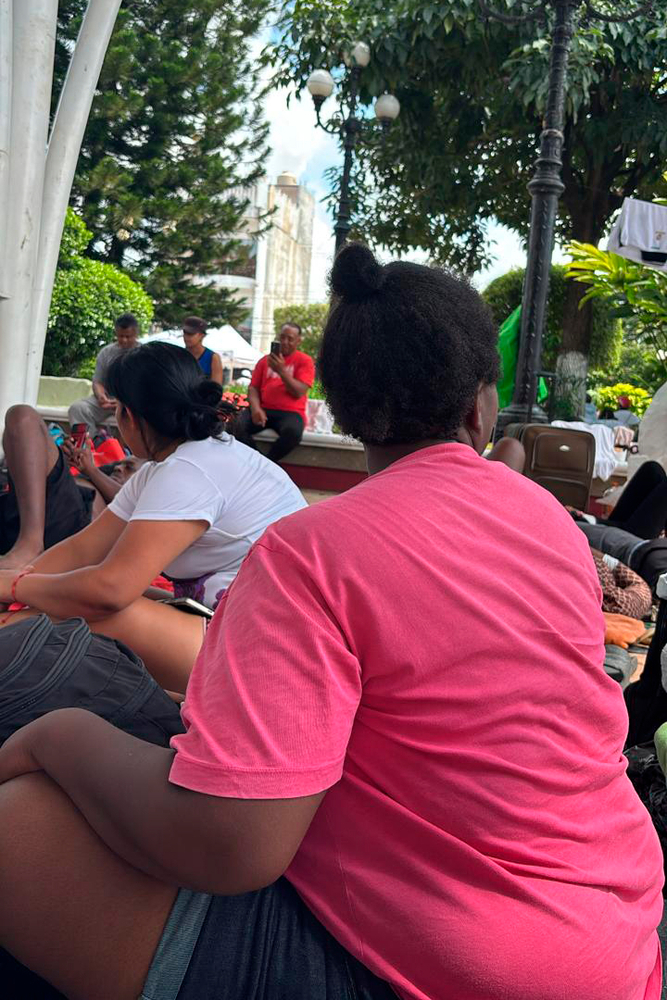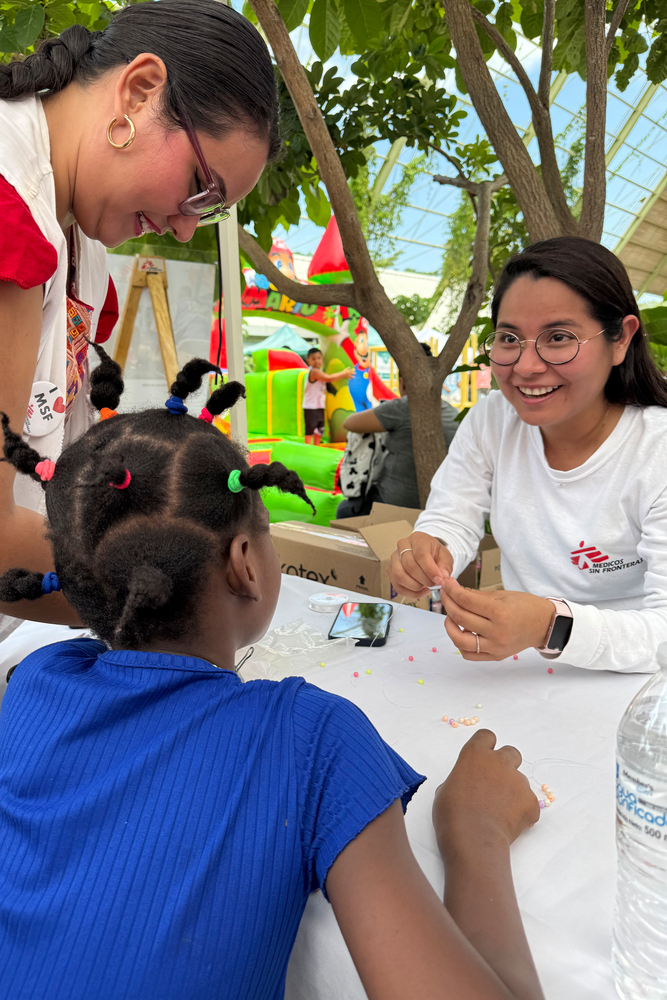Following the tightening of US immigration policy, Tapachula—a city on Mexico’s southern border with Guatemala—is now hosting thousands of stranded migrants and asylum seekers in increasingly precarious conditions. The migrants are unable to continue traveling north and desperate due to the complex bureaucratic procedures required to legalize their status. Médecins Sans Frontières / Doctors Without Borders (MSF) teams have significantly increased medical consultations and mental health care to respond to the needs.
Tapachula, from a transit city to a waiting city
The Trump Administration’s restrictive immigration policy on top of bilateral agreements and regional pressure to curb migration have transformed Mexico into a country of containment. Tapachula, which usually functioned primarily as a transit point for people traveling north to seek refuge in the United States, has inadvertently become home to thousands of migrants who have nowhere else to go. People became stranded in Tapachula when the Trump administration sealed its southern border with Mexico in January 2025 and suspended the main programs for requesting asylum in the United States.
In Tapachula, migrants face lengthy bureaucratic processes to obtain documents that allow them to move legally through Mexico. Meanwhile, they cannot work formally or access basic services, such as accommodation and medical care.
Caravans: A collective response to desperation
As a result of the poor conditions in the city, migrant caravans—groups of hundreds of people walking on foot together for safety and support—have formed again in recent weeks after more than half a year without any mass movements reported. The first caravan departed on August 8 followed by two others on October 1 and October 17. These caravans traveled hundreds of kilometers over several days, although they didn’t manage to reach their goal destination: Mexico City. This form of collective mobility has resurfaced as a strategy to gain visibility and put increased pressure on authorities as they face the impossibility of moving along regular migration routes. The caravans allow migrants to support each other and reduce the risks of traveling alone, such as abuse, extortion, and violence.
“In Tapachula, employment opportunities are very limited, and almost any job requires a residence permit, documents I have not yet been able to obtain due to the delays in the process,” explains Ricardo Nilo, a 31-year-old Cuban who was assisted by MSF while the caravan he was traveling with passed through the town of Escuintla, also in Chiapas state—73 kilometers north of Tapachula. Grisel Hernández, 25, who is also Cuban, adds: “There is no way to regularize my situation. There are no jobs, and the only work they offer to women is in bars, which doesn’t allow me to support my son with dignity.”
Migrants also report irregular ticket sales and discrimination at bus stations. “When I tried to buy a bus ticket, they denied it to me or offered it at exorbitant prices,” says Melissa Ruiz, 25, from Honduras. “Since there were other people in the same situation, we decided to support each other.”

A large but invisible population
It is difficult to estimate how many migrants remain stranded in Tapachula, a city with more than 350,000 inhabitants according to the last census in 2020. The capital of the state of Chiapas has been a hotspot for asylum applications within Mexico in recent years. In 2025, according to the Commission for Refugee Assistance (COMAR, in Spanish), more than 52,000 asylum applications were registered in Mexico. Approximately 66 percent (around 34,320) of which were submitted in the state of Chiapas, with Tapachula being the main reception point.
According to the International Organization for Migration (IOM) and MSF’s anecdotal observations, most people are from Haiti, Cuba, and Honduras, although Tapachula also hosts people of many other nationalities. When this was a transit point, many people sought refuge in “albergues” or shelters, often run by Christian organizations. Today, these shelters—whose services have been impacted by humanitarian aid cuts—have low occupancy (on average, 30 percent of their capacity). Instead of staying in the shelters, many migrants, who in some cases have been in the city for months, choose to rent rooms in peripheral neighborhoods with little access to basic services and a presence of criminal organizations.
This dispersion of where people are sheltering is also a consequence of stigma and the fear of being detained or deported. It makes many people in the migrant community more invisible and makes it more difficult for humanitarian organizations to reach them.

Medical care: Between adaptation and resistance
Due to the sweeping global funding cuts to international aid—including the dismantling of USAID and the sharp reduction of funding from many other major donor countries—many humanitarian organizations have reduced activities or closed programs in Tapachula this year. These cuts have impacted service areas such as protection, asylum applications, care for victims of violence, including sexual violence, and pediatrics.
MSF does not take US government funding, but we have closed projects in other parts of Mexico due to the decline in migration flows. However, in Tapachula we have maintained an active presence due to the needs. We have also made our response more flexible to reach remote areas with mobile clinics where stranded migrants now congregate. Our teams also continue to provide assistance at fixed locations.
Between January and September 2025, MSF teams provided 11,483 medical consultations and 2,390 mental health consultations—128 percent and 53 percent more than in the same period of 2024, respectively. This significant increase reflects the deterioration of living conditions, the continoued violence, and the lack of timely medical care for people.

Mental health is an emergency
The psychological impact of migration is profound and often invisible. People face grief, family separation, violence, discrimination, and a sense of uncertainty. The long waits, lack of options, and hostile treatment aggravate the symptoms of mental health issues.
Public mental health services are limited. The World Health Organization (WHO) recommends between five and 10 psychiatrists per 100,000 inhabitants. However, in Tapachula there is only one psychiatrist from the Ministry of Health for the entire population, at least 17 times below this recommendation. The wait for an appointment can exceed three months.
MSF teams provide individual and group psychological care and prioritize urgent cases such as suicide attempts, sexual violence, or severe symptoms that affect their daily life and functioning.
The reactivation of the caravans, the continued violence, and the lack of effective migration solutions demand a coordinated, sustained response centered on human dignity. “Tapachula reflects the forced pause in the lives of thousands of people and families,” says Lucía Samayoa, MSF coordinator in southern Mexico. “Making visible the stories of those who remain in this limbo is fundamental. We urgently need responses that match the human suffering experienced on the southern border.”












